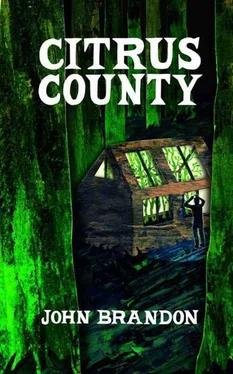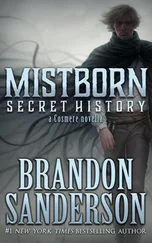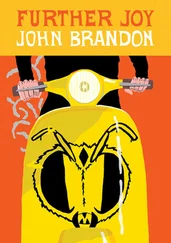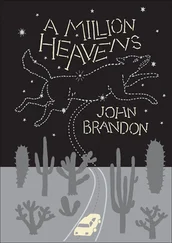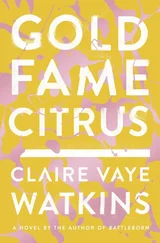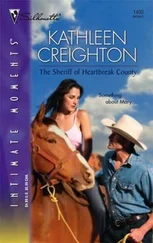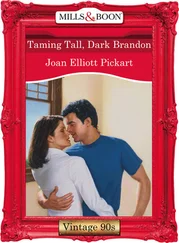Toby looked in the mirror and he couldn’t see anything. He had no idea what he felt toward Kaley, if he would be proud of her if she fought for her life. Toby left the mirror and walked into the woods. Sap oozed down the pine trunks and the azalea patches ogled one another. The only clouds that could survive were the nimble, vicious ones. Toby sensed a disturbance above his head and saw a broad web and a spider with yellow stripes. It had caught some hefty, armored, buzz-sawing beetle from somewhere more tropical than Citrus County. It was amazing that the beetle couldn’t break the web. It was as caught as caught could be. Every couple minutes, when the beetle stilled, the spider shimmied down toward it, knowing it had to do what spiders did, had to wrap the big sucker and administer the poison. When the spider got close, the beetle would flail for all it was worth, quaking the web, almost flinging the spider to the ground. The spider would retreat, wait a minute, then try again. Retreat. Try again. This went on and on.
Shelby had been enjoying a dream about gangs of sly otters who could convince women to do anything. But then she smelled something and the otters were gone. It was morning. The smell wasn’t part of the dream. There’d been a scent in the dream, but not a savory one. There’d been the scent of wet eyelashes. Shelby didn’t know where this new smell was coming from. She kept her eyes shut, didn’t look at the clock. Bacon and maybe something baking. She heard footsteps up the hall and a knock. The door creaked open. Shelby knew it was her father. She rolled and let light into her eyes, her hands shooting down instinctively to make sure she was decent, that she hadn’t writhed her pajamas up or shucked them off. She looked at the head poking into her doorway and it took her an exhausting moment to know that it was indeed her father. He’d shaved his beard. Clean-shaven, Shelby’s father looked vulnerable. The skin on the bottom half of his face was gray, unseasoned.
“Be in the kitchen in five minutes,” he said, and Shelby could see the words being formed in his throat and born out his lips. He made a frisky motion with his eyes, then withdrew his head.
What now? Shelby thought. He’d cooked breakfast, like the old days. No one had cooked breakfast in their kitchen in forever.
Shelby slipped on a pair of her army pants and a tank top. There was so much to shelter her father from, so many threats to deflect. She wasn’t sure she had the energy.
In the kitchen, Shelby saw five or six waffles piled on a plate, more on the way.
“When did we get a waffle iron?” she asked, taking a seat.
“Wedding present,” Shelby’s fathered answered. “It was in the attic.”
“This house has an attic?”
“It’s more of a closet in the ceiling.” Shelby’s father moved the syrup from the counter to the table, pulled two short glasses from a cabinet. He was jittery, as if afraid to lose momentum. He poured Shelby some juice, and then she noticed the juicer and a stack of grapefruit carcasses. There was bacon, too. He pushed a plate of it toward her.
“I didn’t know we had a juicer, either,” Shelby said.
“I got it when we moved down here.” Shelby’s father picked up a napkin and wiped his mouth, though he wasn’t eating anything.
Shelby sipped her grapefruit juice. She squeezed syrup onto her plate and dipped a strip of bacon in it. She ate that strip and then another and then another. She grabbed a waffle. Her father was staring at her — a heavy stare, full of blatant pride.
“I’m going to ignore my real feelings,” he said. “I’m going to make my real feelings think they’re barking up the wrong tree.”
Shelby’s throat was thick with bacon. She wanted to hug her father or say something supportive. She saw herself doing it, hopping up and giving him a big squeeze around his trim waist and saying just the right thing, but she couldn’t get out of her chair. She couldn’t do more than sit there, cutting up her waffle.
“I’m taking you to St. Pete,” he said. “The Dalí museum, then an early dinner at the pier.”
Shelby pushed her plate away, suddenly full. “An outing,” she said.
“That’s what it’ll be.”
Shelby rose and went to her room. She put on lip-gloss and a lime-colored dress, then she brushed her hair.
When she went out to the living room she found her father watching the preview channel, a scroll of all the programs that would air in the next couple hours. He looked overwhelmed. Shelby didn’t see the remote. She went over to the TV and shut it off, stood before it and did a spin, her dress flaring at the bottom. Her father was trying and she was going to help him if she could.
Outside, her father opened her car door, ushering her. They drove down Route 19 in his plain sedan, then cut over to the expressway. They were both daunted by the silence in the car. Shelby had removed Kaley’s car seat weeks ago, but it was still impossible not to notice the lack of Kaley in the back seat, singing and asking questions and thumping the passenger seat with her blunt little shoes. Shelby knew what point her father had reached. He had nothing left but hope and prayer and things like that. He’d reached the point where there were no more physical actions he could take, nothing to do but accept that he’d lost the fight for his youngest daughter and had to move on to other fights. He kept clicking the radio off and on, trolling the static-plagued stations.
“Let’s not talk about her today,” Shelby said.
Shelby’s father patted her arm. He opened his window and turned the radio up. The station was an adult contemporary outfit from Tarpon Springs. They played a couple songs by Neil Diamond or whoever, then the DJ began plugging a bunch of charities.
Shelby loved the paintings of the desert. Though she’d never been to one, she loved deserts. She would save them until she was old; she would not visit a desert until she felt death nearing. The docent at the museum was infatuated with Shelby’s father. She looked only at him when she spoke, and he kept ignoring her, gazing at the paintings.
Shelby decided that she was not utterly desperate. She decided she did not need hopes and dreams. She had a good dad to help and an interesting aunt to visit and a boy to chase. She was going to sit back and watch things get better. If she wanted an open destiny, she had to allow that destiny to take shape.
It had been a week. Nights and days. Too many hours to count. Toby couldn’t stay away any longer. He had to see. Whatever it was, he had to see. Before school, he looped around toward the bunker, this long route to Citrus Middle that had once been a thrill and then a chore and then a ruinous routine and this day was a relief. Toby’s feet knew where to step. His mind was losing darkness with the coming dawn. He felt old in his bones. He felt like the old man everyone had assumed he was.
He stepped over a fallen branch, heavy with young green acorns, and rounded the last pinch of a turn and when he came near he could plainly see that the bunker door was flipped open. He came to a stop, hoping the unfinished light was playing a trick on him. He knew it was no trick. Toby felt that he had a moment before he’d drown in panic. He breathed the morning air. He had a moment before his ears would shut down with heat. His legs started up again. He was approaching the open bunker. The woods were the color of pencil lead.
The broomstick was jammed in the latch. Kaley had forced the door open with a broomstick. The latch was probably broken now. Toby looked in and saw the cot against the wall and saw Kaley’s fallen tower. She’d stacked blankets and pillows and cases of canned goods and the books Toby had brought her and she’d used the bucket the cleaning products were kept in and she’d pushed the latch open and pulled herself out. Toby had no idea when.
Читать дальше
